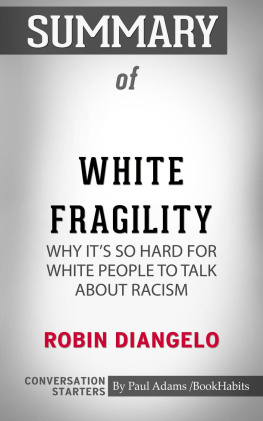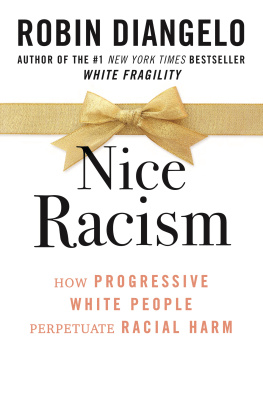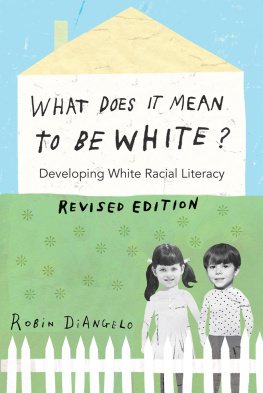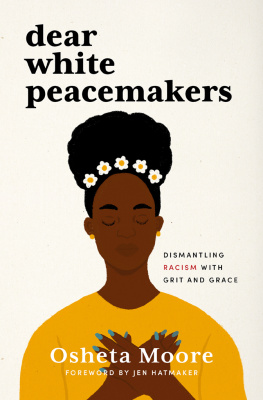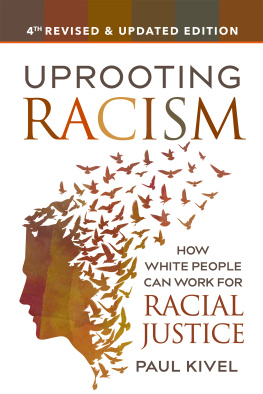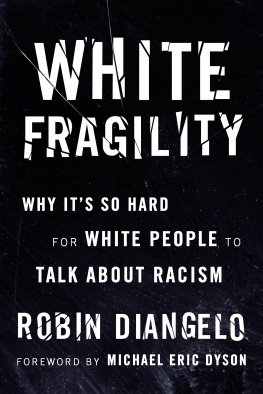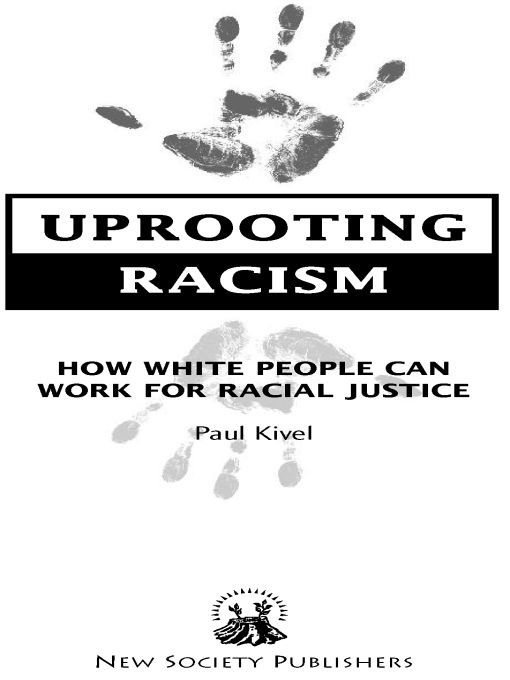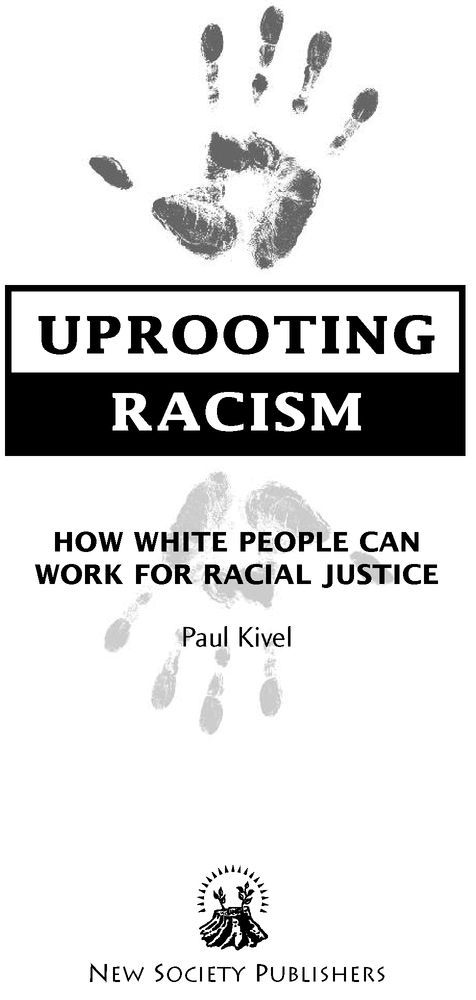Table of Contents
Advance Praise for
UPROOTING RACISM
Uprooting Racism continues to be a powerful and wonderful book,
a major contribution to our understanding of racism as white people.
It answers many of the questions whites have thought about but were
afraid to discuss. Not only does Kivel address tough issues related to
whiteness and racism, creating greater understanding of the complexities
of these issues, but he also identifies specific ways that whites can be
allies for change all done with honesty, forthrightness, respect,
and from the heart. For any white person who is sincere about
working for social justice, heres the source.
Judith H. Katz, Ed. D., author of White Awareness:
Handbook for Anti-Racism Training; and The Inclusion Breakthrough:
Unleashing the Real Power of Diversity
Paul Kivel writes with clarity and depth in a style that is adequately complex for understandings of racism in our time. He uses his writing power to illuminate all the systems, inner and outer, which lead to inequitable distribution of power, respect, money, safety, security, and opportunity in the world. Kivels work inspires workers for social justice in many sectors of the U.S. today. His bibliography alone is worth the price of the book.
Peggy McIntosh, founder and co-director, National SEED Project on Inclusive Curriculum, author White Privilege: Unpacking the Invisible Knapsack
...a courageous, accessible and practical guide for those who
are interested in ending racism. With great wisdom and compassion,
Paul asks each of us to take responsibility for our part in maintaining a system
that is catastrophic for all. I appreciate that he does so without blaming or
shaming, and that he gives clear and useful tools for ending oppression.
As an African-American, I am delighted to have a book to recommend
to white (as well as other) folks interested in creating a world
wherein racism is obsolete. Read this book!
Akaya Windwood, consultant on diversity and organizations
Uprooting Racism is a fact-filled resource for teachers and parents to use in educating ourselves and our young people about the history and the hidden costs of racism in our communities. Kivel presents simple, meaningful actions we can all take to build a more just and healthy society.
Jackie Shonerd, parent and Coordinator for Conflict Resolution Programs, Oakland, (CA) Unified School District
As a woman of color actively engaged in social justice movements for over
25 years, I have often longed for a book like Uprooting Racism to help white people
understand the institutional, systematic, and persistent character of racism in our world.
Paul Kivel has written a handbook for all of us to be able to have a language to
critically examine racism in our lives, and to take action against racism
in our personal lives and in our work for peace and justice.
Luz Guerra, activist consultant/writer
This expanded volume is even more comprehensive, heart-felt and easy to use. The book helps people take responsibility for re-making our institutions while avoiding the guilt and blame trap. An updated and very useful bibliography and in-depth index make this revised edition even more essential as a resource and guide. It is a must for anyone who wants to create settings in which respectful, fair and trusting relations are the norm.
Margo Adair, author of Meditations on Everything Under the Sun and founder of Tools for Change
...the how-to manual for whites to work with people of color to create an inclusive, just world in the 21st century. Uprooting Racism succinctly describes how intricately racism is tied to all institutions and our daily lives. The new edition also tackles current issues including immigration policy, voting rights, and a brief history of our relationship with Arab-Americans. It should be in the toolbox of anyone who is working for an anti-racist society.
Maggie Potapchuk, Senior Program Associate, Network of Alliances, Bridging Race and Ethnicity (NABRE), a program of the Joint Center for Political and Economic Studies
Those of us who commit to the life-long journey of being anti-racist whites need lots of help. The revised edition of Uprooting Racism offers a clear vision of the journeys destination, an invaluable and accessible map and a set of tools for the steps we must take to get there....I recommend it highly and plan to use it in my own work.
Louise Derman-Sparks, co-director, of the Early Childhood Equity Alliance. Author of Teaching/Learning Anti-Racism: A Developmental Approach
Acknowledgments
WE HAVE A LONG AND DISTINGUISHED HISTORY on this continent of white people who have fought against racism and racial violence. This history begins in the days of Antonio de Montesinos and Bartolom de Las Casas, Spanish priests who documented and protested against the atrocities that Columbus and other early conquistadores committed against the Native Americans in the West Indies. It continues today with white people fighting against hate crimes, police brutality, housing and job discrimination, and the recent attacks against immigrants and poor people of color. These efforts by white people have been inspired by the constant, unrelenting fight by people of color for survival, for justice, and for an end to the political, economic, and cultural exploitation they have experienced in this country.
My deepest gratitude goes to the multitudes of people of color who have challenged racism in small and large ways over the centuries, and who have demonstrated by their lives that the lies of racism are untrue and inhumane and violate the integrity of each person who colludes with injustice.
I am also proud to be Jewish and to be able to contribute to the historic struggle of Jewish people to survive waves of anti-Semitism and create our lives anew in the framework of freedom and justice that Judaism provides. I want to acknowledge my Jewish foreparents and the many Jews who are still on the frontlines of the battle for racial justice because they understand the connections between anti-Semitism and racism.
There are many people who have inspired my work and writing, most of whom I have never met. I have read their words, heard their songs, witnessed their actions, and hope to be true to their vision.
I want to acknowledge specifically those who I have learned from and who have supported my work in the last few years. They are Bill Aal, Margot Adair, Martin Cano, Jim Coates, Hari Dillon, Steve Falk, Isoke Femi, Margot Gibney, Sonia Jackson, Francie Kendall, David Landes, Lee Mun-Wah, Nell Myhand, Namane Mohlabane, Daphne Muse, Ayana Morse, Kiran Rana, John Tucker, Akaya Windwood, Shirley Yee, and my mother, Betty Jean Kivel.
I also thank my wonderful Jews schmooze group: Alina Evers, Chaya Gusfield, Julie Nesnansky, Adee Horn, Ariel Luckey, Aurora Levins-Morales, Ilana Schatz, Richard Shapiro, and Penny Rosenwasser.
Several people reviewed early drafts of the book and gave me support and feedback. Special thank yous to Robert Allen, Kostas Bagakis, Allan Creighton, Victor Lewis, Yeshi Neumann, Barry Shapiro, and Hugh Vasquez.
It has been my great pleasure and challenge over the years to work with Heru-Nefera Amen, Victor Lewis, and Allan Creighton at the Oakland Mens Project and Nell Myhand, Hugh Vasquez, and Shirley Yee at the Todos Institute. I have learned much from their passion for justice, their gentle caring, and their fierce dedication to freedom.


